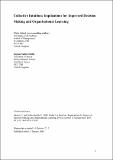Files in this item
Collective intuition : implications for improved decision making and organizational learning
Item metadata
| dc.contributor.author | Akinci, Cinla | |
| dc.contributor.author | Sadler-Smith, Eugene | |
| dc.date.accessioned | 2020-01-03T00:36:13Z | |
| dc.date.available | 2020-01-03T00:36:13Z | |
| dc.date.issued | 2019-07-12 | |
| dc.identifier | 251533801 | |
| dc.identifier | 99ebe501-63f8-4ae7-b423-2f7e4d5ef73c | |
| dc.identifier | 85039985033 | |
| dc.identifier | 000475643400003 | |
| dc.identifier.citation | Akinci , C & Sadler-Smith , E 2019 , ' Collective intuition : implications for improved decision making and organizational learning ' , British Journal of Management , vol. 30 , no. 3 , pp. 558-577 . https://doi.org/10.1111/1467-8551.12269 | en |
| dc.identifier.issn | 1045-3172 | |
| dc.identifier.other | ORCID: /0000-0001-9053-3967/work/77524816 | |
| dc.identifier.uri | https://hdl.handle.net/10023/19217 | |
| dc.description.abstract | This article establishes the foundation for research on collective intuition through a study of decision making and organizational learning processes in police senior management teams. We conceptualize collective intuition as independently formed judgement based on domain-specific knowledge, experience and cognitive ability, shared and interpreted collectively. We contribute to intuition research, which has tended to focus its attention at the individual level, by studying intuition collectively in team settings. From a dual-process perspective, we investigate how expert intuition and deliberation affect decision making and learning at various levels of the organization. Furthermore, we contribute to organizational learning research by offering an empirically derived elaboration of the foundational 4I framework, identifying additional ‘feed-forward’ and ‘feedback’ loop processes, and thereby providing a more complete account of this organizational learning model. Bridging a variety of relevant but previously unconnected literatures via our focal concept of collective intuition, our research provides a foundation for future studies of this vitally important but under-researched organizational phenomenon. We offer theoretical and practical implications whereby expert intuitions can be developed and leveraged collectively as valuable sources of organizational knowledge and learning, and contribute to improved decision making in organizations. | |
| dc.format.extent | 428316 | |
| dc.language.iso | eng | |
| dc.relation.ispartof | British Journal of Management | en |
| dc.subject | HD28 Management. Industrial Management | en |
| dc.subject | H Social Sciences (General) | en |
| dc.subject | NDAS | en |
| dc.subject | BDC | en |
| dc.subject | R2C | en |
| dc.subject.lcc | HD28 | en |
| dc.subject.lcc | H1 | en |
| dc.title | Collective intuition : implications for improved decision making and organizational learning | en |
| dc.type | Journal article | en |
| dc.contributor.institution | University of St Andrews. School of Management | en |
| dc.identifier.doi | https://doi.org/10.1111/1467-8551.12269 | |
| dc.description.status | Peer reviewed | en |
| dc.date.embargoedUntil | 2020-01-03 |
This item appears in the following Collection(s)
Items in the St Andrews Research Repository are protected by copyright, with all rights reserved, unless otherwise indicated.

